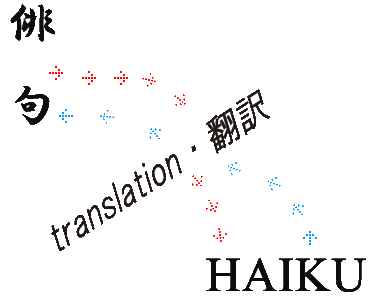

Net Haiku selected by Hasegawa Kai translated by Kim and Pat —May,2012- 本心の見え隠れする扇かな
岩井善子 real intention Comment by Hasegawa Kai: まるで扇で煽ぐたびに人の心が見え隠れするかのよう。そんなことはないのだが。With each wave of the fan, the person’s feelings seem to appear and disappear, although that’s not really so. いつせいに靡きたる葉や杜若 横山幸子 all at once 作者は「たる」が重苦しいことに気づかなければならない。そこでどうするか。 The
poet should be aware that the “taru” in “nabikitaru” feels ponderous. So what should be done? The word “leaves” is
too detailed. It would be sufficient to say all at once 自転車で抜きつ抜かれつ夏に入る 矢野京子 on bicycles Comment by Hasegawa Kai: 「自転車で抜きつ抜かれつ」の勢いが心地よい。中学生か高校生か。ただ「夏に入る」はその勢いそのまま。結果、素直なだけの句になった。ここでもっと間をとって転じてもよい。何とするか、自分で考えてください。 The vigorous rhythm of leaving behind or being
overtaken is pleasant. They must be junior or senior high school students. However
the expression “entering summer” just follows the rhythm, resulting in a very simple
haiku. It would be good to pause here and change the mood. Think for yourself
what you should do.
麦焼きの煙の中に子ら遊ぶ 三木桂子 in the smoke Comment by Hasegawa Kai: 情景は想像できるが、「麦焼き」がややこなれず。ここは「麦殻焼く」などと丁寧にいうほうがいい。
迷子札しかと縫ひ付け更衣 三木紀幸 *maigo fuda a child's identification tag. identification tag Comment by Hasegawa Kai: 新しい夏服にも迷子札を縫いつける。読み古された更衣だが、おもしろいところに気がついた。 With the change into summer clothes, a child's identification tag is sewn onto them. The season word “seasonal
change of clothing” is repeatedly used in haiku, but this haiku’s viewpoint is
interesting.
燕来る主ひそかに老重ね 早川ひでお swallows come — 「ひそかに」に嘆きの声がひそんでいるだろう。 The word “unobtrusively” could suggest the
grief of the poet. そのほか。投句のなかに「若葉風」「新樹光」などという言葉がいくつもありました。これはよく使われますが安易。本来「若葉」「新樹」といえば風や光も感じるもの。5音にしたいのならもっと工夫を。 In other haiku, season words like “wakaba kaze” (young leaves wind), “shinju kô”(newly
green tree light) were
often used, but used too freely. We naturally can feel ‘wind’ or ‘light’ from
the young leaves or newly green trees. If you want to use five syllables words,
you should be more creative. About Hasegawa Kai, Kim Komurasaki(the Shiki team) PDF version |
![]()